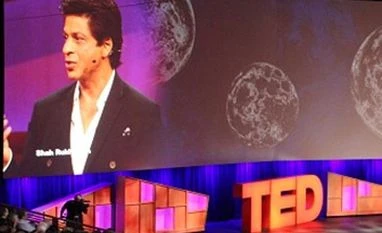Bollywood superstar Shah Rukh Khan was at TED Talks last month, in what was the first-ever address delivered by an Indian actor on the platform. He got the audience cheering and applauding as he delivered a 17-minute speech.
Khan stirred emotions by sharing his thoughts at length about humanity, love, fame, the unprecedented influence of social media and the future prospects of mankind.
Addressing the audience, Khan remarked, "I am an actor, a modern expression of human creativity, and the land I come from is the source of inexplicable but very simple spirituality. The people of this ancient land embraced me in their limitless love."
His TED talk, which centred around the theme 'Future You', was replete with his trademark wit and expressed unapologetically. TED stands for technology, entertainment, and design.
The TED conference organises talks with ‘thinkers’ which last 18 minutes or less, in which the guests share their ideas on their field of expertise.
The video, titled “Shah Rukh Khan: Thoughts on humanity, fame and love”, has now been released on TED’s official YouTube channel. Shah Rukh tweeted the video which has already generated around much retweets and 18,000 likes.
Here are some takeaways from his session
1. Khan celebrated how the Indian populace bestowed him with affection, fame and fortune by saying, “I sell dreams and peddle love to the millions of fans in India, who assume that I am the best lover in the world." He also accepted that he is absolutely self-obsessed, like any other movie star, and took a friendly jibe at those who had not watched his movies. He also said that he has not yet started using botox and has gradually started looking a little more like his wax statue at Madame Tassauds.
2. Shah Rukh drew parallels between his personal self and humanity, saying that over the years, he has experienced both going through the same evolution. He remarked that humanity is a lot like him, “an ageing movie star”. “Wondering whether it (humanity) got it right in the first place, and still trying to find a way to keep on shining regardless,” he said.
3. Furthermore, Khan deliberated on how social media has impacted the lives of millions and how it has put him under a constant spotlight for not only his actions but also his silences. Talking about his decision to begin using Twitter in his late 40s, he said, "Everything I said took a new meaning. Everything I did, good, bad, ugly, was there for the world to comment upon and judge... Reality became virtual and virtual became real." Interestingly, he also cited a personal incident when his youngest child AbRam was rumoured to be his elder son Aryan’s illegitimate child, to illustrate the unwavering power of social media.
4. He recalled one of the toughest phases of his life, from when he was in his early twenties, with some humour: "When I was in my early 20s, I lost both my parents, which I must admit, seems a bit careless of me now... While driving back home, my mother was beside me. My mother looked at me and said, 'Son, when did you learn to drive?'. I thought about it and realised, and I said to my mom, 'Just now, mom.'"
5. In one of the talk's best moments, the 51-year-old actor said, "In its immense generosity, India decided somehow that I, the Muslim son of a broke freedom fighter should become its king of romance... The greatest lover the country has ever seen... And I've learned from these people that neither power nor poverty can make your life more magical or less tortuous."
6. To inspire people to take responsibility to change the world, he went on to offer some advise: "You can use your energy to spread the darkness of destruction or you can use it to spread the joy of light to millions. I have realised that whatever moves you, whatever urges you to create, to build, whatever keeps you from failing, whatever helps you survive, is perhaps the oldest, and simplest emotion known to mankind, and that is love."
7. Khan quoted many such examples and spoke about moving to Mumbai and said how words had a fluid definition and how he experienced “the miracle of human innovation and cooperation."
8. He also quoted mystic poet Kabir's Sanskrit Shlok, "Pothi padh padh kar jag mua, pandit bhayo na koye... dhai aakhar prem ke, jo padhe so pandit hoye." He went on to loosely translate the lines for the audience: "... All the books of knowledge that you might read and then go ahead and impart your knowledge through innovation, through creativity, through technology, but mankind will never be the wiser about its future unless it is coupled with a sense of love and compassion for their fellow beings."
Unlock 30+ premium stories daily hand-picked by our editors, across devices on browser and app.
Pick your 5 favourite companies, get a daily email with all news updates on them.
Full access to our intuitive epaper - clip, save, share articles from any device; newspaper archives from 2006.
Preferential invites to Business Standard events.
Curated newsletters on markets, personal finance, policy & politics, start-ups, technology, and more.
)